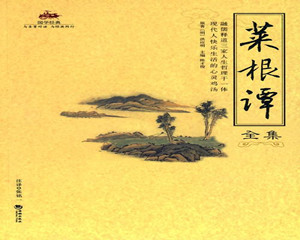《菜根谭》是明朝还初道人洪应明收集编著的儒家经典,是一部论述修养、人生、处世、出世的语录集。 其文字简炼明隽,兼采雅俗,言辞中流露出山林意趣,渗透着万物一体的世界观。开出的处世之方偏重心态和人事,悟虚妄真实之理,指出贫富、尊卑、穷达因为心念使善恶、祸福相互转换,告诫世人及时转念,戒贪少欲,取中庸之道。著作前后内容和深度有所不同,反映出了不同的阅历和境界。

《菜根谭》(持身勿轻、用心勿重)
士君子持身不可轻,轻则物能扰我,而无悠闲镇定之趣;用意不可重,重则我为物泥,而无潇洒活泼之机。
A man of learning should not behave himself with frivolousness; if he does, he first will be perplexed by the material temptations from without and then will lose the temperament of leisure and composure from within. Meanwhile, he should also not give too much thought to his own interest; if he does, he first will be fettered by the material temptations and then will be deprived of the unrestrained vivacity.
(周文标 译)
The learned man should behave with discretion. If he fails to do so, he will make himself vulnerable to external distractions, and will be unable to engage in leisurely and untroubled pursuits. When he applies his mind to something, he should avoid being obsessed with it. If he fails to do so, he will become a slave of the external forces and will not be able to enjoy unrestrained and lively pleasures.
(Paul White 译)
As a noble person I am not flighty in manner. Otherwise I will easily be moved by circumstances, and that's not conducive to calm and settled judgments. At the same time, I am not too unyielding in my judgments, or my vitality would be disabled and my performance muddied.
(Robert Aitken & Daniel W. Y. Kwok 译)
更多精品翻译素材,敬请关注可可英语。












